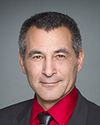It's the whole idea around ballot design and voting equipment.
The way it works here and across our country is that you go to the polling station. You have a ballot. It has three, four, five, six, eight choices for individuals to elect. You take your pen or your pencil and you make your mark beside the person you want to elect. You give it not to the scrutineers, but rather to the Elections Canada employees. It goes into the ballot box.
Having mobile polls makes it much easier for people with disabilities to vote. It makes it easier for unilingual Inuktitut-speaking people to vote. They are getting the ballots themselves, so it is simple and easy.
When people look at a ballot, not everybody sees the same thing. People have dyslexia. There are all kinds of learning issues. You could look at this and see something different from what somebody else sees. As an example, Jack wrote his name in Inuktitut on his name card. When an Inuktitut-speaking person sees it, that might mean something completely different from what he meant to write. Some form of ensuring that the voter is informed on exactly who they are and what their choices on a ballot are....
I don't know what the answer to that is. My main point about the types of changes to make is in getting the polls out to the people—




